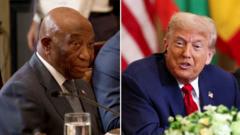The Linguistic Faux Pas: Understanding the Complexities of Language and Identity
 The Tech Times
The Tech Times
In the realm of international diplomacy, language is more than just a means of communication; it is a powerful symbol of identity and respect. Recently, a remark made by former U.S. President Donald Trump has sparked a conversation around language proficiency and cultural awareness in diplomatic settings. During a meeting with Liberia's President Joseph Boakai, Trump complimented him on his English-speaking skills, a comment that has been widely criticized given English is the official language of Liberia.
To fully understand the nuances of this interaction, it's essential to delve into the historical relationship between Liberia and the English language. Established in the early 19th century by freed African-American slaves, Liberia's founding was deeply intertwined with the United States. English was adopted as the official language, serving as a unifying medium in a diverse country with over 20 indigenous languages. This choice was both practical and symbolic, reflecting both the country's ties to America and its aspirations for unity and development.
However, the compliment from Trump, while seemingly innocuous, underscores a persistent issue in international relations: the assumption of linguistic inferiority. In many cases, Western nations are often perceived as linguistic authorities, sometimes leading to misguided assumptions about language proficiency in non-Western countries. Trump's comment, whether made out of genuine admiration or ignorance, reflects a broader issue of cultural insensitivity.
The implications of such remarks are profound. Language is not just a communicative tool; it is a repository of culture, identity, and history. Complimenting an international leader on their proficiency in a language that is officially theirs risks undermining their cultural and national identity. It also highlights a lack of awareness about the historical and socio-political context of the nations involved in such dialogues.
This incident is a reminder of the importance of cultural competence in global leadership. In an increasingly interconnected world, leaders must be acutely aware of the historical and cultural contexts of the countries they engage with. Diplomatic faux pas like these can inadvertently reinforce stereotypes and perpetuate a narrative of Western linguistic superiority.
In conclusion, while Trump's comment may have been intended as a compliment, it serves as a cautionary tale about the complexities of language and identity in international diplomacy. It highlights the need for a more nuanced understanding of the cultural and historical contexts that shape our interactions on the global stage. As leaders and citizens of the world, embracing this understanding can foster greater respect and cooperation among nations.
Source: Watch: Trump praises Liberian president's English, the country's official language
Subscribe to my newsletter
Read articles from The Tech Times directly inside your inbox. Subscribe to the newsletter, and don't miss out.
Written by
